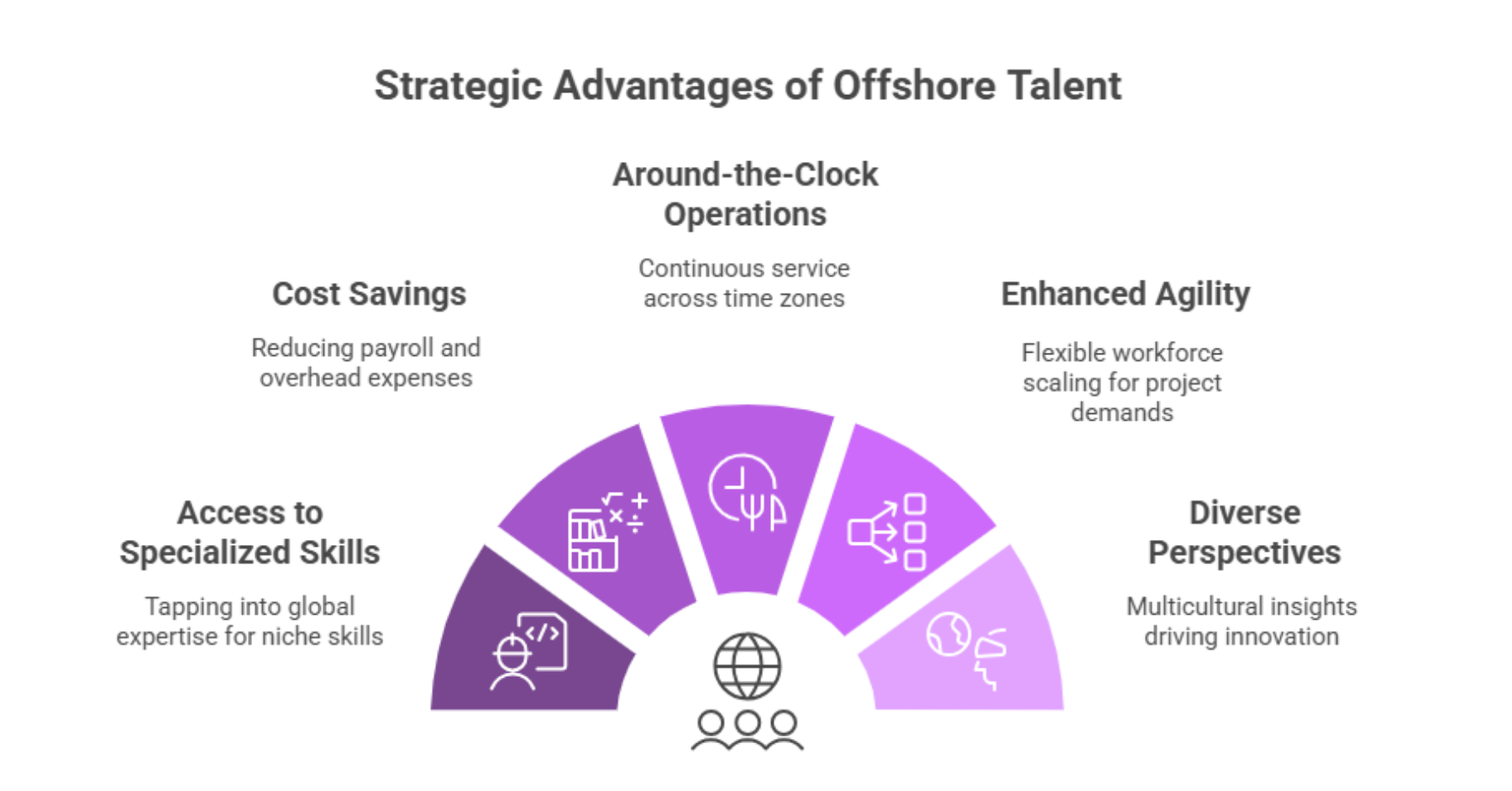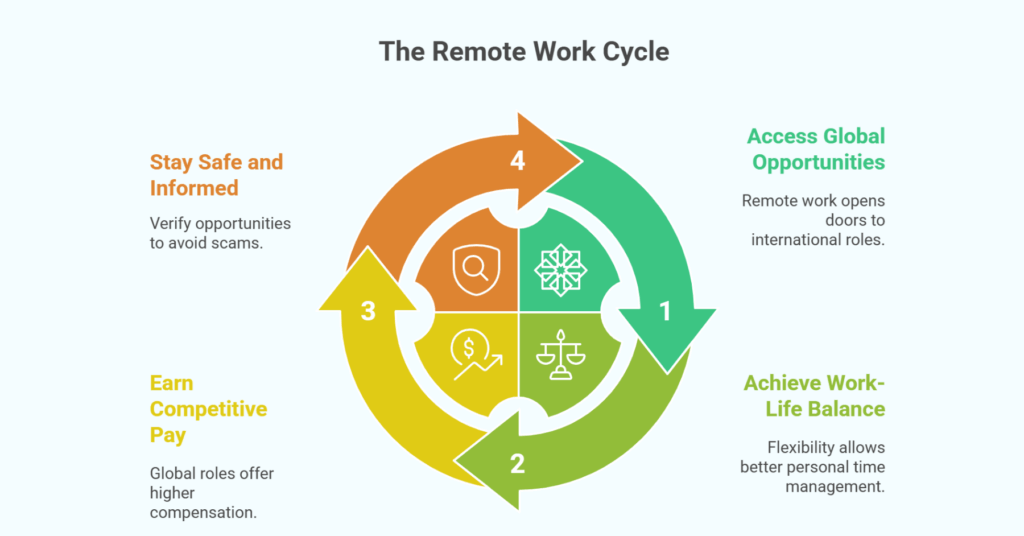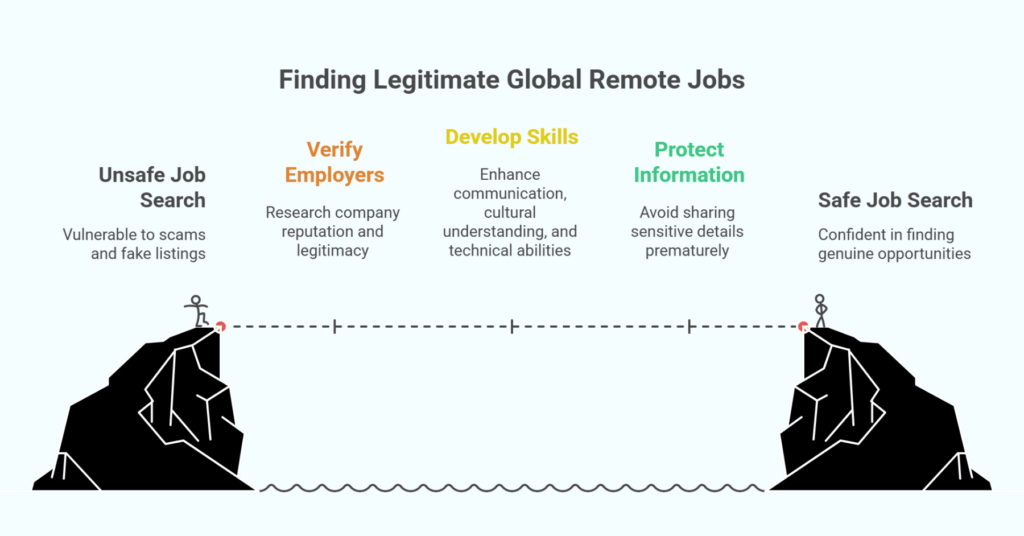“Hire offshore talent to build a diverse, cost-effective, and agile workforce that powers innovation and growth on a global scale.”
As companies strive to stay competitive in an increasingly interconnected world, the concept of “local talent” has evolved into a truly global talent pool. Today, to hire offshore talent means accessing specialized skills, unlocking significant cost savings, and fostering round-the-clock productivity—all key drivers of growth and innovation. Yet, integrating offshore team members presents unique challenges, from navigating legal and compliance complexities to bridging cultural and time-zone differences.
Forward-thinking organizations recognize that a robust offshore recruitment strategy is no longer a novelty but a necessity. By extending hiring beyond borders, businesses can tap into high-demand expertise—software development, digital marketing, data analytics—at a fraction of the cost. Moreover, offshore teams enable continuous operations, ensuring customer support and project workflows never stall. This article explores the compelling reasons to hire offshore talent, provides a step-by-step guide to sourcing and onboarding international professionals, and highlights best practices to foster collaboration and retention. Whether you’re a startup or an enterprise, embracing global hiring is the future of work—and your pathway to scalable success.
1. Key Benefits of Hiring Offshore Talent
Expanding your workforce offshore delivers strategic advantages that fuel long-term business success.
-
Access to Specialized Skills Anytime:
Offshore hiring allows you to tap into niche expertise—such as AI development, UX design, or multilingual customer support—that may be scarce or cost-prohibitive locally. By leveraging a global talent pool, you secure the precise skill sets needed for critical projects, ensuring quality outcomes and a competitive edge. Moreover, the breadth of available expertise accelerates innovation, as diverse perspectives foster creative problem-solving and knowledge exchange across teams. -
Significant Cost Savings and Budget Efficiency:
Employing offshore talent in regions with lower labor costs can reduce your payroll expenses by 30–70%, depending on the market. These savings extend beyond salaries, encompassing reduced overhead for office space, equipment, and benefits. Reinvesting these cost efficiencies into R&D, marketing, or employee development amplifies your organization’s capacity for growth, fueling initiatives that propel revenue and market share. -
Around-the-Clock Operations:
By establishing teams across multiple time zones, your business can deliver continuous service and development cycles. While your domestic team wraps up the day, offshore colleagues pick up client support, code reviews, or content creation, ensuring no downtime. This seamless handoff accelerates project timelines and enhances customer satisfaction through rapid response times, supporting a service-level advantage in fast-paced markets. -
Enhanced Business Agility:
Offshore staffing empowers you to scale your workforce up or down quickly to match project demands, seasonal peaks, or strategic pivots. Flexible headcount management reduces recruitment lead times and financial risk, enabling agile resource allocation. Whether launching a new product line or entering a new market, you can mobilize offshore teams swiftly, maintaining momentum without overextending resources. -
Diverse Perspectives and Innovation:
A multicultural workforce brings varied viewpoints and cultural insights that drive innovation. Exposure to different business practices and customer behaviors fosters creative ideation and inclusive product development. This diversity not only enhances problem-solving but also equips your organization to serve global markets with culturally relevant solutions, strengthening your brand’s international resonance.
2. How to Source and Recruit Offshore Talent
A structured approach to offshore recruitment ensures you find, evaluate, and secure top international professionals.
-
Define Clear Role Requirements and Success Metrics:
Begin by crafting detailed job descriptions that outline responsibilities, required technical skills, language proficiency, and performance benchmarks. Specify working hours or overlap requirements to facilitate collaboration across time zones. Clear role definitions enable offshore partners or recruiters to identify candidates who meet your exact needs, reducing misalignment and shortening time-to-hire. -
Select a Trusted Offshore Recruitment Partner or Platform:
Choose agencies or platforms with proven expertise in your target regions, offering services like candidate sourcing, compliance management, and payroll processing. A reliable partner navigates local labor laws, visas, and tax regulations on your behalf, ensuring legal compliance and mitigating risk. Their local market knowledge accelerates candidate vetting and cultural fit assessments, delivering high-quality talent faster. -
Implement a Robust Screening and Interview Process:
Use a combination of technical assessments, behavioral interviews, and work simulations to evaluate hard and soft skills. Video interviews help gauge communication style, professional demeanor, and cultural compatibility. Standardized evaluation criteria ensure consistency and fairness, resulting in objective insights into each candidate’s capabilities and potential contribution to your global team. -
Draft Comprehensive International Employment Contracts:
Work with legal experts to create contracts that align with local labor laws, intellectual property protections, confidentiality clauses, and termination protocols. Define compensation, benefits, and deliverables clearly. Well-structured contracts safeguard both parties and set expectations for performance and compliance, building trust and reducing disputes. -
Plan a Structured Onboarding and Integration Program:
Onboarding offshore hires effectively involves cultural orientation, tool training, and introductions to team members and workflows. Provide resources—like employee handbooks and collaboration guidelines—and assign a mentor or buddy. Regular check-ins during the first 90 days nurture engagement, address challenges, and accelerate productivity, solidifying offshore hires as integral contributors.
3. Solutions Provided by Remote Recruit
Remote Recruit simplifies the complexities of hiring offshore talent for forward-thinking businesses. For employers, the platform offers AI-powered candidate matching that streamlines sourcing by aligning your role requirements with a curated pool of international professionals. Integrated compliance and EOR services handle local regulations, payroll, and benefits, freeing you from administrative burdens and legal risks. Video interviewing tools and skills assessments ensure candidates meet both technical and cultural criteria, reducing hiring errors.
For job seekers, Remote Recruit provides a user-friendly portal to showcase skills through detailed profiles and video resumes, increasing visibility to global employers. Personalized job recommendations and interview coaching support your success in securing offshore roles. Transparent payment structures guarantee timely compensation, while the platform’s dedicated support guides you through contract negotiations and tax considerations. With Remote Recruit, building and joining offshore teams becomes efficient, reliable, and mutually beneficial.
4. Conclusion
The future of work is undeniably global, and hiring offshore talent is central to unlocking new possibilities for growth, innovation, and competitive advantage. By accessing specialized expertise, achieving cost savings, and maintaining continuous operations, businesses can scale effectively in today’s dynamic markets. However, success hinges on a strategic, well-executed approach: defining precise role requirements, partnering with trusted offshore recruiters or EORs, conducting rigorous screening, drafting compliant contracts, and delivering structured onboarding. Remote Recruit consolidates these best practices into a seamless platform, offering AI-driven candidate matching, integrated compliance, and robust support for candidates and employers alike. Embrace offshore hiring as a forward-thinking strategy—build diverse, high-performing teams that drive your organization toward a prosperous global future.
Get started with Remote Recruit today and unlock the power of offshore talent for your business!
Frequently Asked Questions (FAQs)
1. What roles are best suited for offshore hiring?
Technical positions like software development, data analytics, and IT support, as well as creative roles in design, digital marketing, and customer service, commonly succeed with offshore staffing.
2. How do I ensure legal compliance when hiring offshore?
Partner with an Employer of Record (EOR) service or specialized recruiter that manages local labor laws, payroll, and tax requirements on your behalf to mitigate legal risks.
3. What are the typical cost savings of hiring offshore talent?
Companies can often reduce labor costs by 30–70% compared to local hires, factoring in lower salary expectations and reduced overhead for office space and benefits.
4. How can I assess cultural fit with offshore employees?
Incorporate video interviews, behavioral assessments, and trial projects that evaluate communication style, work habits, and alignment with your company values.
5. How does Remote Recruit streamline offshore hiring?
Remote Recruit provides AI-driven candidate matching, integrated compliance and payroll services, video interviewing tools, and comprehensive onboarding support, simplifying each step of the offshore recruitment process.




